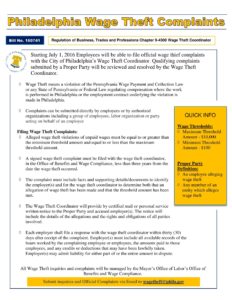PHILADELPHIA – July 6, 2016 – Passed last fall by City Council, Philadelphia’s new ordinance to provide means and procedures for wage theft complaints took effect on July 1, 2016. Employees can now file official wage theft complaints with the City’s Wage Theft Coordinator.
Read/Download the City of Philadelphia Fact Sheet on Wage Theft Complaints:
Here’s what you should know about the new ordinance:
What is Wage Theft?
The term “wage theft” refers to a variety of activities that an entity engages in to prevent workers from receiving legally or contractually promised compensation for their work.
Is wage theft a significant problem in Philadelphia?
Testimony (video excerpted below) before City Council’s Law and Government Committee in Fall 2015 stated that low-wage workers in Philadelphia are facing a wage theft epidemic. A report issued by the Sheller Center for Social Justice at Temple University researchers indicated that as many as tens of thousands of low-wage workers in the city are impacted by wage theft every week. From the report:
- There are 93,000 instances of wage theft in Philadelphia, including overtime violations, shorting hours, and minimum wage violations.
- Philadelphia employees who are victims of wage theft are estimated to lose 15% more of their paychecks. This means low-wage workers lost about $51 – $87 per week.
- Throughout Pennsylvania, employees lose anywhere from $19 million to $32 million each week due to wage theft.
View the full hearing here.
What are the various kinds of wage theft?
Wage theft can take various forms, including:
- Minimum wage violations – With some exceptions, most workers must be paid according to the Pennsylvania Minimum Wage Law.
- Overtime violations – With some exceptions, most hourly workers must be paid one and half times their regular rate for each hour worked over 40 in a given work week.
- Illegal deductions – Examples of illegal deductions include, but are not limited to: damaging equipment or loss of equipment, cash shortages from retail workers’ drawers, or deducting from a restaurant server’s pay when a table walks out or for other performance-related reasons.
- Tip violations – Forcing employees to give any portion of their tips to their employer is a form of wage theft.
- Under-counting of hours worked – Deliberately under-counting hours worked or forcing employees to work “off the clock” is a form of wage theft.
- Delayed or missed wage payments – Deliberately holding a final paycheck or failing to pay an employee within a reasonable time is a form of wage theft.
How does someone submit a wage theft complaint? What information should the complaint contain?
Proper parties who believe that they have been subjected to wage theft should submit a signed complaint to the City Wage Theft Coordinator. The complaint can include:
- Descriptions of the facts, dates, nature and of the wage theft; Copies of any supporting documents or evidence of the wage theft (employer names and locations, pay stubs, records of withheld tips, records of illegal deductions, emails, etc.)
The above items should be emailed to [email protected]
(If you have questions or concerns about what documentation you should submit, please email them to this address as well.)
Who is considered a Proper Party?
A proper party is:
- an employee alleging wage theft;
- any member of an entity or group alleging wage theft.
What is the minimum and maximum amounts of wages about which an employee can make a claim?
Complaints filed with the Wage Theft Coordinator must meet a minimum threshold of $100 in alleged lost wages and a maximum of an alleged $10,000 lost. Complaints above and below those thresholds may be covered under other state or local statutes. The Wage Coordinator will provide information on these statutes if needed.
How long does a employee have to file a complaint?
The Wage Theft ordinance established a three-year statute of limitations for complaints. This is one reason why it is important to file promptly and to include as much supporting detail as possible, including dates, when submitting a complaint.
What happens after someone submits a complaint to the Wage Theft Coordinator?
The Wage theft Coordinator will provide written notice to both the Proper Party and the employer(s) details of the allegations and the rights of all parties involves. The employer(s) then has thirty (30) days from the receipt of the complaint to submit a response to Wage Theft Coordinator. This response must include all available records of the hours worked by the proper parties, amounts paid to these parties, and any lawful credits or deductions taken from the compensation to these parties.
Within sixty (60) days of receiving the employer’s response or 110 days of the complaint filing (whichever is sooner), the Wage Theft Coordinator will issue written findings of fact and a written adjudication. Depending on the finding, the Coordinator may order payment and issue penalties for the employer to be paid to the proper party or parties. Decisions made by the Coordinator can be appealed in court within 30 days.
More information on Wage Theft:
Read the City of Philadelphia’s Wage Theft Ordinance.
View video of additional Wage Theft Testimony before the City Council Committee on Law and Government (October 2015)
View video of passage of the Wage Theft Ordinance by City Council (November 2015)
Community Legal Services of Philadelphia’s Wage Theft Resource Center
Wage Theft.org – A project of Interfaith Worker Justice



